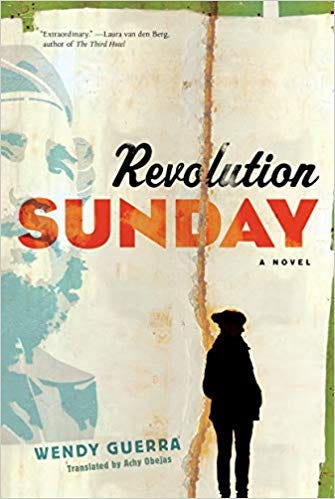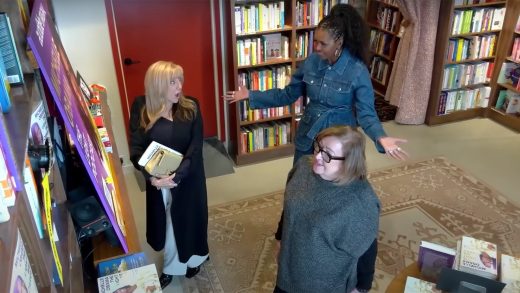An excerpt from Revolution Sunday by Wendy Guerra about a writer living under surveillance in Havana
Issue №341
Jump to story
AN INTRODUCTION BY ACHY OBEJAS
Wendy Guerra is the most important writer to come out of Cuba so far this century. What sets Guerra apart from other Cuban writers is her stalwart commitment to the truth. She tells the stories of her times without varnish, without tricks, without pretending any ideological purity or, frankly, commitment to any ideology at all except, well, to telling the truth.

Telling the truth is both a challenge and the objective for most writers, but perhaps more so for writers who live in Cuba and in places like it. Cleo, the protagonist of Revolution Sunday, is a writer whose family has always been under surveillance in Havana. But since the death of her parents, the surveillance has intensified, personalized, and started to erode Cleo’s sense of self. Now, the surveillance shows up at her front door in the form of a recording of Cleo’s friends bashing her work. Who, Cleo wonders, is this surveillance really protecting? As this excerpt from Revolution Sunday (which I was lucky enough to translate) shows, totalitarianism not only descends top down, but also sneaks up on us from below, gets in our systems, hacks our minds and sentiments. It’s like a poisonous fog.
Guerra writes fiction, but it’s a fiction based in reality. She lives in Cuba (insists on living in Cuba), and it’s no metaphor or formality: She really does live in Havana in spite of many opportunities to reside elsewhere. It is a life filled with dualities: she may have a hat collection but she also has a ration card. So she writes from the inside, from experience, refusing filters, refusing irony, refusing to surrender joy or beauty or independence or complexity. She writes in the open, in the light.
Significantly, Wendy Guerra is not published in Cuba though she’s widely read; she’s ostracized from professional circles but she’s well-liked, even loved, by many of the very people in those professional circles. She may well be the most well-known Cuban writer of her generation — no small feat for someone who doesn’t exist as far the critics and all of officialdom in her home country are concerned.
And, yet, to think of Guerra only as a Cuban writer would be an injustice. Her writing may center around Cuba but it takes on the great themes of our times: the staggering loneliness of being marginalized, race, gender, celebrity, the shattering of utopian dreams, depression and mental illness, immigration and exile, the power of art, the arresting force of love as well as its futility. Guerra’s attention to these themes are subtly carried by her voice. Hers is an intense , fresh voice; an original.
Read Wendy Guerra to be emboldened to seek the truth. Read Wendy Guerra to find it.
Achy Obejas
Translator
A Story About the Volatility of a Codependent Friendship
Revolution Sunday
Excerpted from the Novel
by Wendy Guerra
Somebody comes to your door with a “treasure” they’ve found for you, something so hot, it smokes: a recording of a few of your friends or acquaintances, a little drunk at some party, talking smack about you. In this case, it’s the only Havana party I’ve attended in years, yesterday’s party.
I still smell of cigarettes and rum from last night and the consequences are already playing out.
It’s noon and I haven’t had my first coffee of the day yet, I haven’t showered, I haven’t brushed my teeth. I’m sitting on the toilet trying to reconstruct faces, dialogues, circumstances. My soul isn’t even back in my body yet, and everything’s irritating. But it must be time, because there’s a knock at the door. I should pull myself together and show my face. They insist, they come at me in the fiercest way to make me confront the raw, revealing truth.
A golden iridescent string appears like an arrow, the smell of cologne breaks through the tiles. The magic string lands and connects me with life: water on water; I wake up and mark my turf. I spring toward the day, filling it with song, the echoes in the bathroom, and the bad news . . . which won’t wait.
Oh God/ to raise horses again/ they’re nothing/ more than sad beasts . . .
Radio Reloj, noon in Havana, Cuba; 6 p.m., Madrid, Spain; 6 p.m., Paris, France; 9 a.m., Vancouver, Canada;11 a.m., Quito, Ecuador; noon, La Paz, Bolivia; 11:30 a.m., Caracas, Venezuela; noon, Santiago, Chile;5 p.m., London, England;11 p.m., Hanoi, Vietnam . . . now broadcasting, Radio Reloj, from Havana, Cuba . . .12:01 p.m., Radio Reloj.
The State Security guy assigned to my family has finally shown up. It’s the same charismatic, charming, and almost indispensable guy who sat with us at the dinner table while my mother set traps for him so she wouldn’t fall for his ruses. It’s the same guy who informed on my parents’ experiments and their possibilities of escaping while carrying classified information. There’s a very brief moment when Cuban science knows things the intelligence agencies don’t know. For reasons of security, they’re not told about certain decisive steps. These are delicate moments. And, those, surely, are precisely when Alberto, the “family spy,” established the “best” connections between my parents and his superiors.
Which of the recent studies were authorized? Were they on animals or diseased humans? Is the brain an active area of research in Cuba? What are the ethical limits? Has anyone signed a consent form for research in the name of a terminally ill relative? Are unidentified bodies used for research? Are you planning on going to any conferences? Will you see any deserters or relatives during this trip? Do you remember that doctor, also a researcher who defected, the cardiologist who now lives in Puerto Rico? All this was put on the table in the most natural way and, between rum and beer, cigars from the corner store and Populares cigarettes, a chain of jokes would be set loose to get much more out of my mother than a mere laugh.
“Better the devil you know,” my mother would say, resigned, her cigarette held high, making rings that would dissolve on contact with her very thin nose and the thick lenses of her seventies- style glasses.
She’d throw out abstract and alarming adjectives just for him, Latin phrases or very rare grammatical constructions straight out of her incomprehensible scientific vocabulary, her very stiff manners marked by how she was raised, and her medical education. My mother never forgot the Hippocratic oath, and maybe that was what saved her from falling into decadence and treason. She had a canon of wisdom and ethics this society could never change, but which it tried to violate time and again. That’s how she spent most of her life: on the lookout so she wouldn’t lose her way.
My father was the opposite: always silent. He’d sometimes share his rum with the “family spy.” When he came by himself to do his questioning, my father, drink in hand, would signal to my mother as if this matter belonged to some other department. His greatest weapon was always delegating.
In my adolescence, all that always seemed like adult stuff, problems between my parents, and a performance that was well beyond me . . . But I was totally wrong. The representation of that betrayal was just the first step in the disintegration of our family. Later, we would have a front-row seat to view the process of our lives falling apart. It’s possible everything that happened afterward, even the accident, was a result of Alberto’s snitching.
Now I’ve taken my mother’s place. I take a deep breath. I commit myself to her and follow her example. The dinner table isn’t set but the guest continues to play out his dangerous role. I don’t understand why he visits me. Can I be a real object of persecution? Or is it an old habit, his addiction to informing, that compels him to investigate me? Do they still listen to this man in this country? Is he capable of spying on both artists and scientists? What’s his specialty? Are they still using old KGB methods? Why me? Who am I to him, to them?
The techniques have gotten more sophisticated, technology has reached us here, and the “family spy” connects his memory stick to my computer. I make coffee as I listen to the blaring soundtrack from La fiesta vigilada.
I try to imitate my mother’s gestures, to repeat them as if I were rehearsing a ballet. I try to stay calm and go with the flow . . . Oh! But it’s terrible to listen to this bunch of friends and acquaintances, and even strangers, finding the perfect sarcasm to demean what I’ve achieved.
They ignore how difficult it’s been and is to be alive in my right mind.
Jokes, jokes, sarcasm . . . Lies or modifications of the truth. The recording comes to an end. A profound silence.
It would seem as if my world ends right there and then. I want to flee from my own house, which feels confined and suffocating now.
What am I going to do?
How many times have you itemized your parents’ or your friends’ shortcomings aloud, or even your own, crying in a lover’s bed, or in the quotidian darkness of a friend’s room as dawn breaks on a terrible Saturday?
This is overwhelming.
What do they want from me? What do they expect from these games of social daggers? To bring me down? To disarm me? Disconnect me from others? To isolate me more and more until I’m speechless? Why is this man at my door with this stick full of voices? What’s the endgame after they do us the favor of having us deny the few affections that still survive? How did they record this?
You can recognize the accents. There’s irony in the air, and the way they insist on how thin you are, your histrionics, your fears, your weak points, your personal failures, and, above all: your past. Where did Compañero Alberto dig this up? Is it just a coincidence he showed up here with this time bomb in his hands? Should we be grateful to know who’s who? Are you a bad person? Did you behave badly enough in your life to deserve this? Shouldn’t you try to not damage other people’s sacred intimacy? Is this some kind of Decalogue? Or a right violated in the course of the divine and fragile passage of daily living?
I cross the hallway to my studio. I look at a photograph of my mother . . . When the hell have you ever cared what anyone ever said about you? she asks from the picture frame.
Should I thank him? Invite him in for lunch?
No, you can’t be grateful to people who do you these kinds of favors. You ask him to leave your house immediately, you kick him out of your life, and push him into the abyss because of what he is, a traitor. But it’s too late; you’ve heard everything.
And your other friends? And the other parties? And the authorities? And you, with you? Where are you?
You look around your living room, check your bedroom, walk around the kitchen, and analyze the layout of your domestic life. They’ve applied their techniques here too. Where did they put the microphones?
In the picture frames, in the decor, in your clock, in your cell phone, in your stereo equipment . . . Or did you really think they didn’t spy on you?
They say this happens in countries all over the world, that it’s a question of national security. Matters of state, a priority policy to protect the citizenry.
But, me? Who am I? A small woman who writes things and can’t deal with her own fate, much less with State Security or the integrity of the nation.
They record your phone conversations and file them away until they determine you are not a danger to the public. Thirty years will go by, your voice will change, you’ll lose the last of your loved ones and that’s when they’ll be done with you. And for what? Who will feel secure because of your insecurity?
Where are the microphones so I can pull them out by the roots? Where are they?
We can’t know. Can the compañero who records the conversations tell me?
I pick up the phone and ask: “Where are the microphones?”
The truth is that the real microphone — after years of whispering and refraining from saying what you think — the real artifact is already inside you.

About the Author
Wendy Guerra, born in Havana in 1970, is a Chevalier des Arts et des Lettres and was selected for Bogotá 39, the prestigious group of writers from the Hay Bogotá project. In 2015 and 2016, she was a visiting professor at Princeton and UCLA. From an early age, she found success as a poet, publishing her first volume of poetry aged 17 while attending the University of Havana. She later pursued studies in filmmaking and hosted a number of TV shows about culture and television on the national Cuban broadcaster. She began to circulate and publish her texts abroad, to great critical acclaim. As a result of this success, she has been considered with suspicion by Cuban intelligence services and has remained largely unpublished in her native country. Drawing inspiration from her diaries and also from the visual arts, her texts often combine filmic, personal, and poetic elements.
About the Translator
Achy Obejas is the award-winning author of The Tower of The Antilles, which was nominated for a PEN/Faulkner award. Her other books include the critically acclaimed Ruins and Days of Awe. As a translator, she’s worked with Wendy Guerra, Junot Díaz, Rita Indiana, Megan Maxwell and many others. A Havana native, she lives in Benicia, California.
About Recommended Reading
Recommended Reading is the weekly fiction magazine of Electric Literature, publishing here every Wednesday morning. In addition to featuring our own recommendations of original, previously unpublished fiction, we invite established authors, indie presses, and literary magazines to recommend great work from their pages, past and present. The Recommended Reading Commuter, which publishes every Monday, is our home for flash and graphic narrative, and poetry. For access to year-round submissions, join our membership program on Drip, and follow Recommended Reading on Medium to get every issue straight to your feed. Recommended Reading is supported by the Amazon Literary Partnership, the New York State Council on the Arts, and the National Endowment for the Arts. For other links from Electric Literature, follow us, or sign up for our eNewsletter.
Excerpt from Revolution Sunday by Wendy Guerra Copyright © 2016, translated by Achy Obejas copyright © 2018, reprinted by permission of the publisher, Melville House Publishing.

Who Will Feel Secure Because of Your Insecurity? was originally published in Electric Literature on Medium, where people are continuing the conversation by highlighting and responding to this story.















